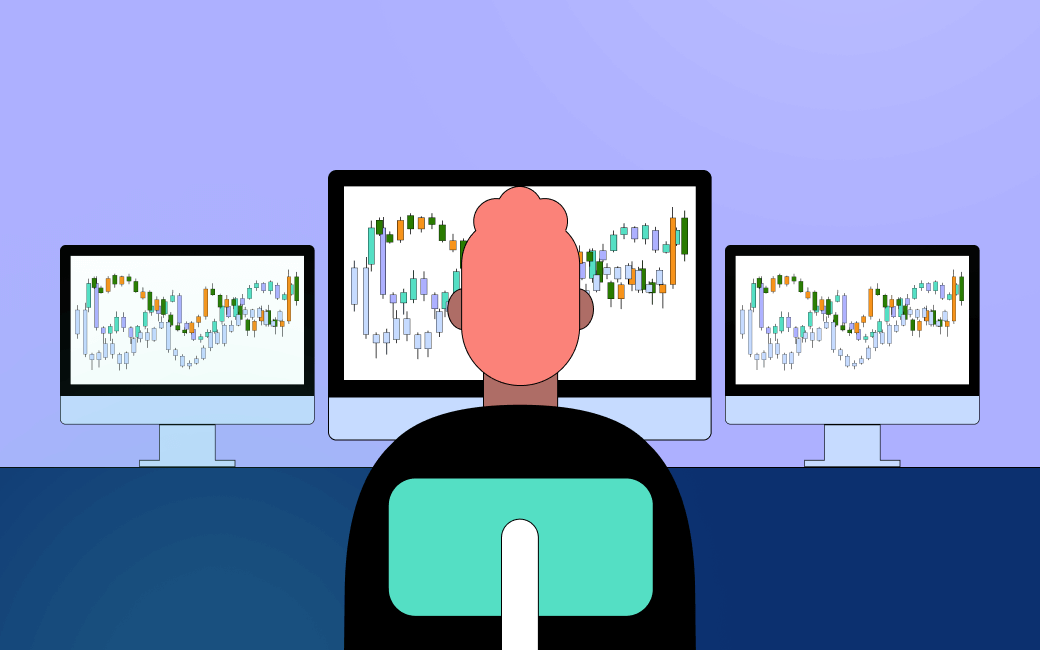Introduction
“Greed and fear are both good and healthy for an investor and capital markets as a whole. Emotions are like fire, beneficial if controlled, destructive if wild.”
― Naved Abdali
This same mantra has been quoted in manifold ways by investors time after time. Billionaire Warren Buffett, finance author and investor Naved Abdali, and trading psychology analyst Mark Douglas can be found repeating a golden battle cry of investment: keep your emotions out of the market.
Psychology is as important as strategy and available capital when it comes to trading. You cannot make effective decisions if you allow yourself to be ruled by emotions. There is a fine line to tread between “gut” instinct and cool-headed analytical thinking and one that trips up many a trader. Find out how to build your advanced trading mindset and leverage your psyche in the market.
Trading Mindset – It's All In The Mind

As fight or flight animals, fear is a part of our DNA. During periods of intense stress or anxiety, our bodies trigger a biochemical response causing hormonal changes throughout the body.
Trading is exhilarating, but the excitement that comes with playing the markets can be a double-edged sword. Alongside the adrenalin of placing an order that could return in manifold, there is an accompanying mental pressure. Certain trading styles such as scalping require making high-impact decisions under time pressure. Spending hours in front of pricing charts and staking individual funds on new strategies can be stress-inducing.
Many expert investors and market psychologists would urge the same advice: harness your emotions to your advantage. Like many things in life, moderation is key. Overanalyzing and placing too much faith and emphasis on the numbers fails to acknowledge the inevitable human factor within market prices. On the other side of the coin, traders who are ruled by their state of mind and gut instinct may fail at the first stumbling block.
Develop a Trading Brain
In 2021, Norman Welz published a thesis on trading psychology that sparked a wildfire of conversations and generated an enthusiastic wake of trading disciples. “Tradingpsychologie” is a German book that advocates for the discipline and applied psychology when making market decisions. In other words, traders need not only rein in their emotions, and keep their assumptions in the charts in restraint, but also actively train their brains.
As a trading psychologist, Welz is a strong advocate for the power of the individual mind to influence success. As he points out, each trader will have a unique set of contextual influences (family, friends, socioeconomic background, innate personality) that will affect their trades.
In order to keep the myriad influences at bay, a trading mindset must be developed, trained, and implemented into a trading strategy. There is a strong pool of thought that mind patterns can be both analyzed and changed. Therefore, the environmental factors that might have made you into an assertive and analytical trader can be honed and replicated in someone else. Equally, beginner traders making emotional-based trading decisions can adapt their thinking patterns to a more profitable approach.
Remember that a successful trader will follow some simple steps:
- Research your markets;
- Compare strategies (try social trading for tried and tested approaches);
- Assess your finances and your risk comfort level;
- Develop a trading plan with clear goals and milestones;
- Implement a risk mitigation strategy (such as stop-loss orders)
- Stick to your plan.
Personality Modification
The Welz approach is proactive and even involves a form of hypnosis which he alleges has helped clients secure Olympic victory. The German psychologist claims that the mental blockages and barriers need to be resisted before one can understand the market psychology and trade accordingly. There are some golden quotations to bear in mind when cultivating your trading mindset without needing a total personality overhaul.
Quotations For a Trading Mindset
“I know where I’m getting out before I get in.” – Bruce Kovner
Bruce Kovner is a billionaire hedge-fund manager. His advice is that you need to establish your exit before entering the market: stop-loss orders and other risk mitigation tools can help you trade comfortably.
“Trading is not about being right or wrong. It’s a probability game.” –Mark Douglas
Ultimately, the message here is that there are always hidden factors at play when making any trade. Even the best strategy on paper may flounder in a live market, and the same could surprise one in reverse. Keep your expectations realistic and never assume success.
“Once you have a plan, always invest within the boundaries and parameters of your plan. Never bend your rules to accommodate your guts.”― Naved Abdali
Abdali is an investor who believes in the critical importance of a trading plan. Keeping your trading decisions contained within the parameters of a well-researched and executed trading strategy is a way to cull emotions in the market.
“In this business, if you’re good, you’re right six times out of ten. You’re never going to be right nine times out of ten.” Peter Lynch
When assessing your trades, it is easy to be overcritical. Losses can be magnified and dwarf your successes due to the sting of surprise when a strategy fails to pan out as planned. Nonetheless, this golden advice from successful investor Peter Lynch should be taken to heart: losses are expected, and even expert traders and veteran investors are no stranger to the odd loss. Accepting the reality of failure is a necessary step towards future success.
Excellence is an art won by training and habituation. We do not act rightly because we have virtue or excellence, but we rather have those because we have acted rightly. We are what we repeatedly do. Excellence, then, is not an act but a habit. – Horace
Sometimes, the best advice has been under our noses for centuries. Roman poet Horace was well aware of the importance of discipline and self-control. This age-old adage will go a long way in helping train our trading mindset.
“When you genuinely accept risks you will be at peace with the outcome.”– Van K. Tharp
Van K. Tharp is a trading psychology expert. He believes that fear is the main obstacle towards becoming a successful trader. There is a grey area between the shrewd caution that can bolster you against excessive risk-taking and the fear that may hold you back from profitable trades.
Developing An Advanced Traders Mindset
In the same way that no single strategy wins every time, there is no shortcut to developing a millionaire trading mindset. However, you can take steps to build your trading brain and begin rewiring the patterns to leave fear and emotions at the trading door.
Of course, market research and understanding the nuances of trading psychology is vital in trading. Most important of all, however, is having an excellent broker. It is worth researching the best brokerage platform to suit all trading styles. Take our platform TradeOr as an example. Not only do we offer trading across a multitude of markets (crypto, indices, stocks, metals, and forex), but we ensure our clients are equipped with every possible asset to prepare them for market success.
TradingView is one of the integrated features of our innovative platform. All TradeOr clients get premium access to one of the world’s best charting software programs. TradingView operates as customizable charts whereby you can plot technical indicators and trade in real-time market environments directly through the program. Not only a powerful charting tool, but TradingView is also a hub of social trading, bringing together a network of 30 million investors and traders in a global information hub.
FAQ
- How to manage your emotions when trading?
With the wealth of literature warning against the dangers of emotional trading, it can be easy to assume that any emotion is negative while trading. Yet the reality is that there is a subtle middle ground between emotion-based trading and a mindset that fails to appreciate the sentiments within prices.
- What is lemming in the trading community?
From an investment perspective, a "lemming" is a trader or investor who fails to make independent decisions but operates more with the herd mentality displayed in animals like lemming or sheep. In other words, following the crowd no matter what the outcome.
- How do you develop a trading mindset?
To promote a winning trader's mentality, you must train your brain not to make decisions from an emotional perspective. Ideally, you want to use the analytical tools available (technical indicators, price charts, automated software) while also recognizing the role of human sentiment in market decisions.
